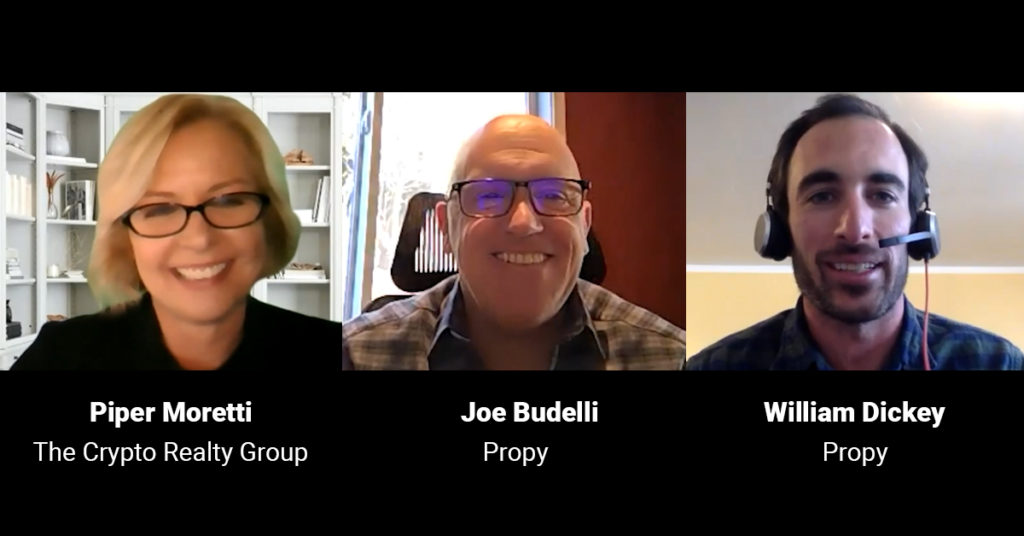Propy’s weekly webinar Episode #45 is with Piper Moretti of The Crypto Realty Group

Piper Moretti of The Crypto Realty Group, along with Propy’s Chief Revenue Officer, Joe Budelli, and William Dickey, tech advisor, discuss the differences between blockchain, crypto currency and smart contracts, along with resources to help people learn more about these exciting new technologies and currency. You can contact Piper at the thecryptorealtygroup.com
How Piper first became involved with crypto
Piper explains that a few years ago she was working with a buyer looking for property in Manhattan Beach. After she had shown him a few properties, he told her that he was going to buy using Bitcoin. At that time, there was no information about how to do this, as this was the second property in California to transact using crypto currency. Piper did her research, found a team willing to work with Bitcoin, and was able to put all the pieces together to make this property close.
After that, she did three more Bitcoin transactions with this buyer, and each situation was different. There wasn’t an escrow company set up to send and receive Bitcoins, so every step of the way, Piper had to figure it out. She didn’t realize that no one else was doing this until she was invited to be part of a panel at the newly formed International Blockchain Real Estate Association. When she shared that she had done four Bitcoin transactions, she was treated like an expert in crypto currency and had celebrity status. Since then, she has concluded a fifth Bitcoin transaction.
Investing in Bitcoin
Because Piper was going to be speaking on the panel about Bitcoin, she felt she needed to educate herself about what was involved with investing in crypto currency. She talked with her buyer and he taught her what she needed to do to invest. At that time, the price was around $750, and Piper thought she was too late to invest in it. By the time they had closed a couple more transactions, the price had jumped to $2,000.
To get her buyer’s deals done, they had to work closely with Bitpay. During one meeting with the CEO of Bitpay, he confidently stated that the price would be at $5,000 by the end of 2017. At this point Piper decided she better start investing. While she was apprehensive about this investment, she started out with buying five bitcoins.
Resources for people wanting to invest in Bitcoin
Piper says she always encourages people to go to blockgeeks.com, which was where she initially learned about blockchain. She recommends their Blockchain 101 course. Piper also recommends that agents become Crypto certified through Propy’s course. Even if you aren’t an agent, but are interested in real estate and Bitcoin, this is a good course to go through to understand the basics. Piper is also the Chair of the International blockchain Real Estate Association, and states that there is a wealth of knowledge to be gained with this group. If she doesn’t know the answer to a question, she will know someone who does.
Finding listings that accept crypto
At this point there isn’t a centralized marketplace where people can search for listings that accept crypto currency. There are a few platforms that Piper has seen, but she can’t get in contact with anyone at those sites to confirm that they are legitimate. She encourages agents to make this part of their business, but first an agent really needs to understand how crypto works and become educated about it. It’s important to understand how title and escrow will work using crypto. In California, she explains, you can’t convey title in a wallet-to-wallet transaction because escrow and title are separate. Everyone has to remain compliant.
Adoption of new technology
Traditionally, it takes 3-5 years for the market to really understand a new technology and adopt it, Joe states. He suspects one of the roadblocks for fast adoption with crypto is there simply isn’t enough people in title and escrow who understand this currency. Because of that, Joe wonders if it will take much longer for crypto to be adopted.
Piper shares that two years ago when she was giving classes and lunch-and-learns about these topics, she felt the industry was about five years out from seeing any real change. Now, two years later, she still feels that the industry is still five years out. While there have been some advancements, including a blockchain escrow company in LA, overall adoption has been very slow. At the start of 2021, with the price increasing dramatically with the current bull run, there is new interest in this. The question remains on how to get municipalities on board with this, and make this legitimate for real estate.
Defining blockchain and smart contracts
“The easiest way to explain blockchain,” according to Piper,
“is it is a digital form of record keeping, that is immutable, timestamped, and can’t be altered in any way.”
It keeps everyone honest because of those features. She thinks that people frequently think blockchain and crypto are the same thing, but they aren’t. Piper explains that you can have blockchain without crypto, but crypto can’t exist without blockchain.
Blockchain is important especially for title purposes. Piper explains that records stored on paper or on a computer can be destroyed in a fire or a flood, for example. When that happens, property owners have to prove that they actually own a property. She states that after Hurricane Katrina property owners spent the next 10-12 years to get their property back on record. Having these records on blockchain would prevent this. Utilizing blockchain technology means that when a title is recorded, the blockchain is recorded on the deed, and you have a QR code that will show you everything that was done during the transaction, all time stamped.
It’s important to note that while all the records of everything that happened during a transaction is stored on the blockchain, permissions are set so only certain information can be shared with people—so your private information is secure, Piper explains. The buyer of your property isn’t going to be able to access your social security number or bank routing number.
Willie believes people are scared of blockchain because they don’t understand it. When he does demos for people to show them how blockchain works, and how easy it is to retrieve information, they have that “aha” moment that helps them understand that blockchain is simply an accessible digital record.
Joe explains that he tells people to imagine being able to instantly find every version of everything you every typed and saved on your Google Drive. That is what blockchain can do.
“The ink on paper can be destroyed, paper itself can be destroyed,”
explains Joe,
“but blockchain can’t be.”
He continues by saying that if he didn’t have a copy of his recorded deed, or the QR code that goes with it, he could contact his agent, broker, or a company like Propy, and they would be able to retrieve the information for him.
Piper states that smart contracts provide checks and balances during a transaction, as you can’t move on to the next phase of the transaction until all the previous conditions have been met. This helps to mitigate fraud and eliminate mistakes.
Financing backed by crypto assets
Piper states that with the increase in crypto prices, people want to hold on to it. Predictions are being made that crypto prices will increase to most likely six figures by the end of 2021. There are options available now for getting collateralized loans that will allow someone to hold onto their crypto, and take out a 50, 60, 70% LTV. While the rates are higher to do this, because you’re not selling your crypto, it’s not a taxable event. When you sell crypto to buy a house, capital gains come into play.
Impediment to blockchain becoming mainstream
Piper states that real estate agents are very slow moving when it comes to adopting new technology. It boils down to fear of change and
“this is the way we’ve always done it.”
She shares that recently in one of the real estate Facebook groups she’s on, an agent was asking for an example of a spreadsheet to track multiple offers, and was shocked that someone was still relying on a spreadsheet rather than embracing a technology that could better manage this. Piper recommended that they go to Propy.com to help them manage their multiple offers better.







